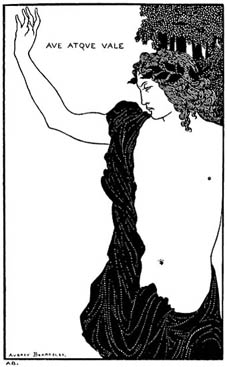The most hated album in jazz
| Miles Davis’s On the Corner.
Day: 26 October 2007
Ave Atque Vale!

Aubrey Beardsley illustrates Catullus for The Savoy, no. 7 (1896).
Farewell then, Mister Aitch, now he’s decided to call it a day at the wonderful and unique Giornale Nuovo. He’d been blogging (must we call it that? It seems we must…) for five years which probably makes him first generation in the concentrated timescale of web-existence. Five years is a long time to be doing anything never mind regularly throwing hard-won morsels of research to the browsing hordes.
His posts will be missed here since it was his journal, along with a handful of others (Bldg Blog, The Nonist, BibliOdyssey among them), which confirmed for me that this discipline could have a purpose beyond mere diaristic vanity, something I enjoy reading but had no desire to engage in myself. One of the specialist concerns at Giornale Nuovo was the etching or engraving and Mister Aitich managed to cover this area so comprehensively I frequently found that artists I’d considered writing about were already discussed there in far greater detail than I could summon the energy (or the book resources) for myself. Those book resources are a thing of wonder and I remain eternally jealous of Mister Aitch’s library.
Happily Giornale Nuovo will remain online as an archive, which is good to hear. This raises again the spectre of what’s to happen to all this energy and activity when we let it go. Books regularly outlive their creators but all these fragile electronic media are dependent on the whims of webhosts and developing technology. Do we want this work to survive for the benefit of future historians or not? Or should we celebrate it as ephemeral and transient? What happens when the web advances beyond Unix networks, PHP and HTML? The British Library has already expanded its deposit scheme to encompass electronic works but online publications differ from their paper equivalent in that the publisher—legally obliged in the UK to send one copy of every printed volume to the British Library—is invariably also the author. What happens if the author dies before they have a chance to submit their work which then sinks into the swamp of a billion other weblogs? When do you decide to submit a work which is forever unfinished?
I’ll leave those questions to librarians and the scholars at the Long Now Foundation who consider some of the issues presented by the prospective obsolescence of present technology. In the meantime we’ll raise a farewell toast to Mister Aitch and wish him all the very best. Don’t be hesitant in browsing his archives, there’s a wealth of eclectic, eccentric and neglected culture there deserving of your attention.
